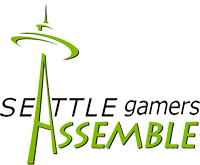Forming a Gaming Community: Difference between revisions
| Line 75: | Line 75: | ||
* Local game publishers | * Local game publishers | ||
* High schools, colleges and universities | * High schools, colleges and universities | ||
Approach these contacts and try to build bridges. Exchange links and posters. Organize demos and common events. | |||
Your most natural allies are other gaming groups and associations in the area. Participate in one another's events, coordinate so you won't compete for players, share resources. Here are some examples based on our experience in Seattle: | |||
=PROMOTING= | =PROMOTING= | ||
Revision as of 22:09, 3 January 2007

Seattle Gamers Assemble! (SGA) is a loose community of role-players centered around Seattle, Washington. After several years of operations, we thought it might be nice to share what we've learned about setting up a gaming community.
(Article in progress; these are merely some talking points that will be developed over the next few days.)
WHAT IS A GAMING COMMUNITY?
In this article, we mean by "gaming community" a group of people that adopts a certain structure or organization to support game-related activities. At SGA, we focus on role-playing games but most of this advice is directly applicable for other types of games.
People
- Different skills and interests
- Newcomers and people without a regular game looking to form small gaming groups
- People looking for drop-in games or players
- People who like to try different games
- Game designers looking for playtesters or actual play
Structure
- Online group
- Gaming circle
- Game club
- Meetup group
Activities
- Weekly games: See our article on Weekly Short-Shots
- Meetups
- Bring-and-battle
- Tournaments
- Mini-conventions/Game Day
- Full-scale conventions
- Social events
LINKING UP
Online Presence
- Mailing list
- Meetup group
- Yahoo! group
- Gaming blog
- Wiki
Networking
A community is a fractal beast: communities can network into larger communities. Don't limit your horizons with a very narrow definition of what your group is about, at least not on first approach. Sure, if you play DnD or Exalted in a metropolitan area you can probably find enough players to get a game going and even to organize events. But why not start wider and meet more people? If the community is very large, it will sub-divide soon enough anyway. But most of the time, you will find the opposite problem: too few people rather than too many. So how do you build your local gaming community?
Ask yourself: Who else is out there that shares your hobby? Although our main focus at SGA and in this article is role-playing games, most of us are interested in many other related activities:
- Board games
- Miniatures games
- Wargames
- Card games
- Live-action role-play (LARP)
- Console or online gaming
- Comic books
- Science-fiction and fantasy
- Creative writing
- Game design
- Theatre
- Movies
So your contacts in the local community might include:
- Gaming clubs and associations
- Gaming stores (RPGs but also board games, card games, miniatures, hobby stores, etc.)
- Comic book stores
- Book stores, especially those specializing in science-fiction and fantasy
- LAN gaming oufits
- Writing groups and workshops
- Improv theatre groups and workshops
- Movie clubs
- Local game publishers
- High schools, colleges and universities
Approach these contacts and try to build bridges. Exchange links and posters. Organize demos and common events.
Your most natural allies are other gaming groups and associations in the area. Participate in one another's events, coordinate so you won't compete for players, share resources. Here are some examples based on our experience in Seattle:
PROMOTING
Creating Buzz
- People
- Events
- Locations
Promotional Materials
- Posters
- Handbills
- Ads
RESOURCES
- Game Circles: Bringing gamers together
- Games Workshop's gaming club resources
- Negative Space's Role-Playing Meeting Grounds
- Wikipedia:Game club (article stub)
(To be continued.)
Return to Seattle Gamers Assemble!